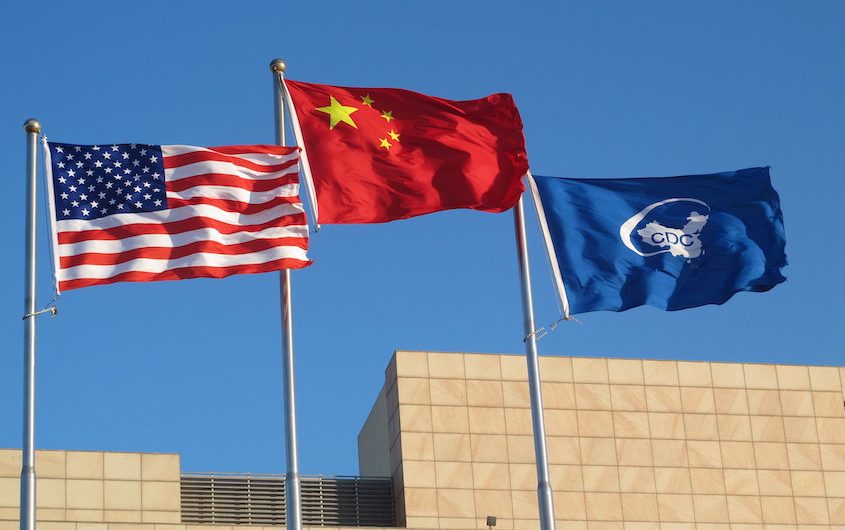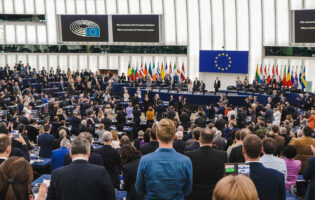
CDC Global via Flickr
A New Age of Transatlantic Alliance?

Anna Stahl
Jacques Delors Centre
Dr. Anna Katharina Stahl is a Policy Fellow for European foreign and security policy at the Jacques Delors Centre. Her work focuses on the EU’s relations with China and the United States, as well as geopolitics in Africa and the Middle East. Before joining the Jacques Delors Centre, Anna Stahl was a project director with the Friedrich-Ebert-Stiftung (FES) in Tunisia. Dr. Stahl held research positions in Europe, the United States and Africa with the EU-China Research Centre at the College of Europe, the United States Institute of Peace (USIP), the American Institute for Contemporary German Studies (AICGS), the Institute for European Studies (IES) at the Free University of Brussels and the Centre for Chinese Studies (CCS) at Stellenbosch University.
Anna Stahl obtained a PhD in political science from the Free University of Brussels (VUB) and holds degrees from the College of Europe, the Université Libre de Bruxelles (ULB), the Institute d’Etudes Politiques de Lille and the Westfälische Wilhelms-Universität Münster. She is the author of the book “EU-China-Africa Trilateral Relations in a Multipolar World” (Palgrave Macmillan, 2018).
She is a 2018-2019 participant in AICGS’ project “A German-American Dialogue of the Next Generation: Global Responsibility, Joint Engagement,” sponsored by the Transatlantik-Programm der Bundesrepublik Deutschland aus Mitteln des European Recovery Program (ERP) des Bundesministeriums für Wirtschaft und Energie (BMWi).

Yixiang Xu
China Fellow; Program Officer, Geoeconomics
Yixiang Xu is the China Fellow and Program Officer, Geoeconomics at AGI, leading the Institute’s work on U.S. and German relations with China. He has written extensively on Sino-EU and Sino-German relations, transatlantic cooperation on China policy, Sino-U.S. great power competition, China's Belt-and-Road Initiative and its implications for Germany and the U.S., Chinese engagement in Central and Eastern Europe, foreign investment screening, EU and U.S. strategies for global infrastructure investment, 5G supply chain and infrastructure security, and the future of Artificial Intelligence. His written contributions have been published by institutes including The Chinese Academy of Social Sciences, The United States Institute of Peace, and The Asia Society's Center for U.S.-China Relations. He has spoken on China's role in transatlantic relations at various seminars and international conferences in China, Germany, and the U.S.
Mr. Xu received his MA in International Political Economy from The Josef Korbel School of International Studies at The University of Denver and his BA in Linguistics and Classics from The University of Pittsburgh. He is an alumnus of the Bucerius Summer School on Global Governance, the Global Bridges European-American Young Leaders Conference, and the Brussels Forum's Young Professionals Summit. Mr. Xu also studied in China, Germany, Israel, Italy, and the UK and speaks Mandarin Chinese, German, and Russian.
__
The Covid-19 pandemic and growing tensions between the U.S. and China brought even greater global global attention to this year’s American presidential election. Despite the victory of the Democratic challenger Joe Biden, America’s relations with China will not significantly alter and rather resemble an iron fist in a velvet glove. While U.S.-China great power rivalry will remain the new reality, Biden’s victory could mark the beginning of a new transatlantic alliance and contribute to the EU’s geopolitical ambition. In this policy paper, Anna Stahl and Yixiang Xu argue that the EU should seize the opportunity of U.S. interest in closer collaboration on China and offer a ten-point agenda for an EU-U.S. dialogue on China. Moreover, this policy paper offers innovative policy recommendations for new formats of trilateral and multilateral cooperation with China and the U.S.
This policy paper was originally published by the Jacques Delors Centre in Berlin on December 21, 2020.









